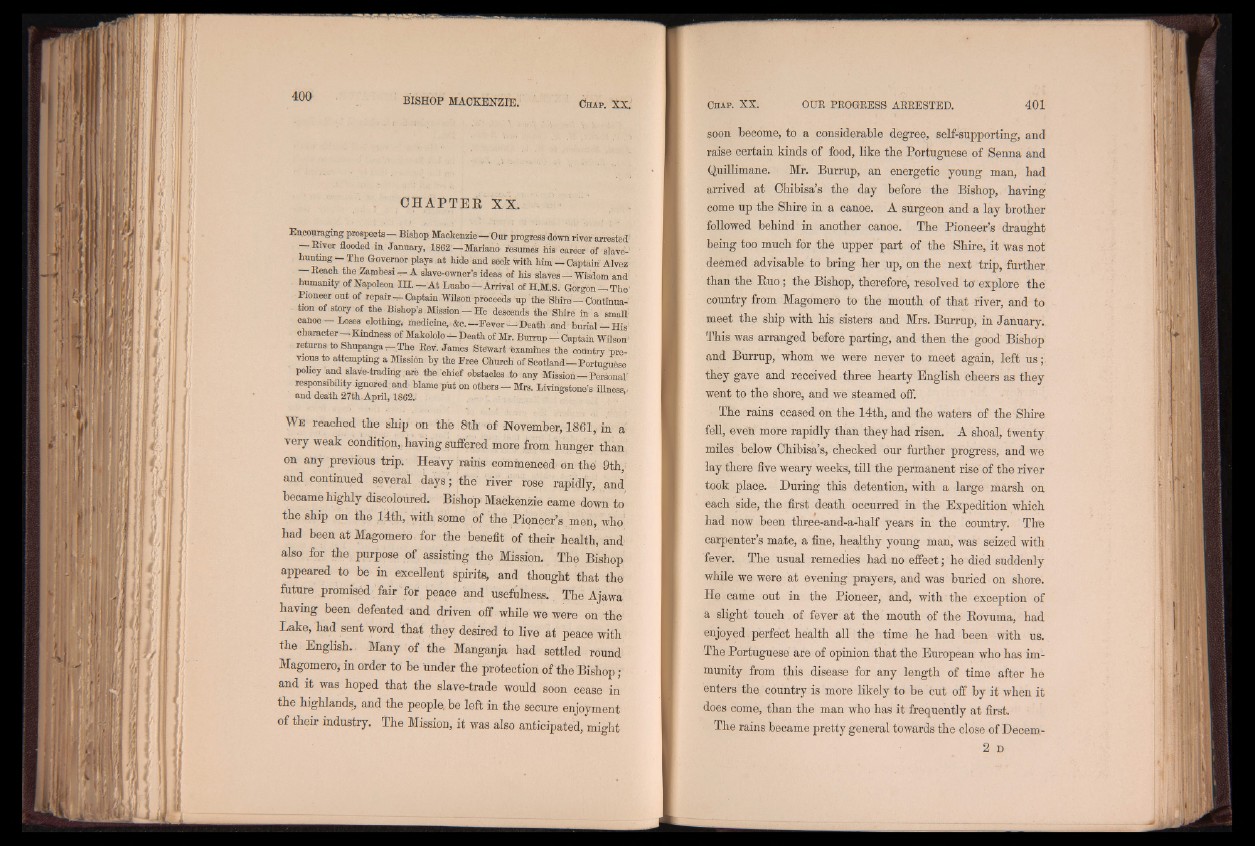
C H A P T E R X X .
Encouraging prospects Bishop Mackenzie—Our progress dowti river arrested1
Biver flooded in January, 1862 —Mariano resumes his career of slave-1
hunting — The Governor plays at hide and seek with him — Captain Alvez
— Beach the Zambesi —A slave-owner’s ideas of his slaves — Wisdom and
humanity of Napoleon IH. —At Luabo—Arrival of H.M.S. Gorgon —The’
Pioneer out of re p a ir^ Captain Wilson proceeds up the Shire — Continuation
of story of the Bishop’s Mission — He descends the Shire in a small-
canoe— Loses clothing, medicine,<&c.—Fever— Death and b u ria l-H is ’
character—Kindness of Makololo-peath of Mr. Burrup — Captain Wilson’
returns to Shupanga—The Bev. James Stewart-examines the country previous
to attempting a Mission by the Free Church of Scotland:—Portuguese
policy and slave-trading are the chief obstacles to any Mission Personal
responsibility .ignored; and- blame put on o th e r s - Mrs. Livingstone’s illness
and death 27th. April, 1862.. }
We reached the ship on the 8th of November, 1861, in a
very weak condition,, having suffered more from hunger than
on any previous trip. Heavy rains commenced on the 9th,
and continued several days ; the river rose rapidly, and
became highly discoloured. Bishop Mackenzie came down to
the ship on the 14th, with some of the Pioneer’s men, who
had been atMagomero for the benefit of their health, and
also for the purpose of assisting the Mission. The Bishop
appeared to be in excellent spirits, and thought that the
future promised fair for peace and usefulness. The Ajawa
havmg been defeated and driven off while we were on the
Lake, had sent word that they desired to live at peace with
the English.. Many of the Manganja had settled round
Magomero, in order to be under the protection of the Bishop ;
and it was hoped that the slave-trade would soon cease in
the highlands, and the people, be left in the secure enjoyment
of their industry. The Mission, it was also anticipated, might
soon become, to a considerable degree, self-supporting, and
raise certain kinds of food, like the Portuguese of Senna and
Quillimane. Mr. Burrup, an energetic young man, had
arrived at Chibisa’s the day before the Bishop, having
come up the Shire in a canoe. A surgeon and a lay brother
followed behind in another canoe. The Pioneer’s draught
being too much for the upper part of the Shire, it was not
deemed advisable to bring her up, on the next trip, further
than the Ruo; the Bishop, therefore, resolved to explore the
country from Magomero to the mouth of that river, and to
meet the ship with his sisters and Mrs. Burrup, in January.
This was arranged before parting, and then the good Bishop
and Burrup, whom we were never to meet again, left us;
they gave and received three hearty English cheers as they
went to the shore, and we steamed off.
The rains ceased on the 14th, and the waters of the Shire
fell, even more rapidly than they had risen. A shoal, twenty
miles below Chibisa’s, checked our farther progress, and we
lay there five weary weeks, till the permanent rise of the river
took place. During this detention, with a large marsh on
each side, the first death occurred in the Expedition which
had now been three-and-a-half years in the country. The
carpenter’s mate, a fine, healthy young man, was seized with
fever. The usual remedies had no effect; he died suddenly
while we were at evening prayers, and was buried on shore.
He came out in the Pioneer, and, with the exception of
a slight touch of fever at the mouth of the Rovurna, had
enjoyed perfect health all the time he had been with us.
The Portuguese are of opinion that the European who has immunity
from this disease for any length of time after he
enters the country is more likely to be cut off by it when it
does come, than the man who has it frequently at first.
The rains became pretty general towards the close of Decem-
2 D